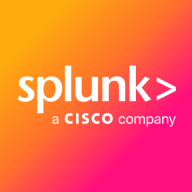

Splunk Enterprise Security and Fortinet FortiAnalyzer compete within the cybersecurity space. Splunk has advantages in pricing and support, while FortiAnalyzer is preferred for features and value.
Features: Splunk Enterprise Security provides powerful threat detection, extensive data analysis, and customizable dashboards, highly suitable for complex environments. Its operational intelligence allows organizations to react faster to outages. Fortinet FortiAnalyzer excels with integration with other Fortinet solutions, advanced reporting, and centralized logging, offering clear advantages due to its seamless integration.
Room for Improvement: Splunk Enterprise Security can be complex to deploy, and users sometimes find the learning curve of its SPL challenging. Additionally, it may require improvement in automation capabilities. Fortinet FortiAnalyzer might benefit from enhancing its user interface and expanding third-party integrations. It could also improve its reporting customizations and real-time data processing.
Ease of Deployment and Customer Service: Deploying Splunk Enterprise Security is comprehensive but supported effectively. Customer service is robust, assisting throughout the setup. Fortinet FortiAnalyzer is straightforward to deploy, particularly with other Fortinet products, benefiting from efficient customer service and easier integration within the Fortinet ecosystem.
Pricing and ROI: Splunk Enterprise Security, despite a higher initial cost, offers long-term value with its extensive feature set and strong support, enhancing ROI over time. Fortinet FortiAnalyzer provides a lower setup cost with quicker ROI through effective integration and efficient security information management, making it an attractive option for immediate cost efficiency.
The impact of the tool is low when the functionalities are inaccessible due to resource consumption.
Fortinet is highly efficient for moderate deployments and provides a secure platform for medium-sized networks and data centers.
I have seen a return on investment with Fortinet FortiAnalyzer due to its competitive pricing and straightforward licensing model based on the amount of log data processed per day.
The documentation for Splunk Enterprise Security is outstanding. It is well-organized and easy to access.
We couldn't calculate what would have been the cost if they had actually gotten compromised; however, they were in the process, so every investment was returned immediately.
On average, my SecOps team takes probably at least a quarter of the time, if not more, to remediate security incidents with Splunk Enterprise Security compared to our previous solution.
Customer service and support for Fortinet FortiAnalyzer are quite helpful and responsive.
Technical support is good, and I rate it ten out of ten.
The support service is very slow and incompetent.
We have paid for Splunk support, and we’re not on the free tier hoping for assistance; we are a significant customer and invest a lot in this service.
I have had nothing but good experiences with Splunk support, receiving timely and helpful replies.
We've had great customer success managers who have helped us navigate scaling from 600 gigs to 30 terabytes.
Fortinet FortiAnalyzer is scalable, especially for the VM versions, as additional space can be provisioned from the servers as needed.
FortiAnalyzer is a scalable product.
It typically handles three to five years of expansion effectively.
We currently rely on disaster recovery and backup recovery, which takes time to recover, during which you're basically blind, so I'm pushing my leadership team to switch over to a clustering environment for constant availability.
It is one of the things that separates it from other tooling, and if not, it is the most scalable solution out there.
They struggle a bit with pure virtual environments, but in terms of how much they can handle, it is pretty good.
We faced some CPU consumption issues, which caused the machine to slow down and required a restart of FortiAnalyzer.
It remains stable during implementation for one or two years.
It provides a reliable solution for managing network-wide data.
They test it very thoroughly before release, and our customers have Splunk running for months without issues.
Splunk has been very reliable and very consistent.
We need more SMEs, and there is no mechanism to tell us about indexer or search head issues.
When licensing, each device is licensed separately, such as the firewall, which can become expensive.
This would help in analyzing various security incidents and events more effectively by delivering a handful of relevant logs instead of thousands.
Enhanced deep inspection features would make troubleshooting easier.
Improving the infrastructure behind Splunk Enterprise Security is vital—enhanced cores, CPUs, and memory should be prioritized to support better processing power.
Splunk Enterprise Security is not something that automatically picks things; you have to set up use cases, update data models, and link the right use cases to the right data models for those detections to happen.
For any future enhancements or features, such as MLTK and SOAR platform integration, we need more visibility, training, and certification for the skilled professionals who are working.
Its licensing model is based on the amount of log data processed per day, making it more cost-effective compared to QRadar, which is EPS and device-based.
In terms of pricing, FortiAnalyzer is not expensive.
In the Indian market, Fortinet's pricing is very competitive, allowing us to win most of our deals.
I saw clients spend two million dollars a year just feeding data into the Splunk solution.
The platform requires significant financial investment and resources, making it expensive despite its comprehensive features.
I find it to be affordable, which is why every industry uses it.
The advanced analytics capabilities aid in threat detection by providing visibility into indicators of compromise.
The most valuable feature of Fortinet FortiAnalyzer is its ability to simplify and display logs clearly, providing details like which IPs are accessing the system, the destination, and the policies applied.
The log management is useful as we have connected around two hundred eighty-five walls and around fifteen to twenty plus firewalls with Fortinet FortiAnalyzer, making it highly beneficial compared to logging into each individual firewall.
This capability is useful for performance monitoring and issue identification.
I assess Splunk Enterprise Security's insider threat detection capabilities for helping to find unknown threats and anomalous user behavior as great.
Splunk Enterprise Security provides the foundation for unified threat detection, investigation, and response, enabling fast identification of critical issues.
| Product | Market Share (%) |
|---|---|
| Splunk Enterprise Security | 7.1% |
| Fortinet FortiAnalyzer | 1.7% |
| Other | 91.2% |

| Company Size | Count |
|---|---|
| Small Business | 58 |
| Midsize Enterprise | 20 |
| Large Enterprise | 31 |
| Company Size | Count |
|---|---|
| Small Business | 109 |
| Midsize Enterprise | 50 |
| Large Enterprise | 264 |
Fortinet FortiAnalyzer is a powerful platform used for log management, analytics, and reporting. The solution is designed to provide organizations with automation, single-pane orchestration, and response for simplified security operations, as well as proactive identification and remediation of risks and complete visibility of the entire attack surface.
Fortinet FortiAnalyzer Features
Fortinet FortiAnalyzer has many valuable key features. Some of the most useful ones include:
Fortinet FortiAnalyzer Benefits
There are many l benefits to implementing Fortinet FortiAnalyzer. Some of the biggest advantages the solution offers include:
Reviews from Real Users
Below are some reviews and helpful feedback written by PeerSpot users currently using the Fortinet FortiAnalyzer solution.
PeerSpot user Imad A., Group IT Manager at a manufacturing company, says, “You can monitor all appliances from a centralized location. You have a front dashboard for all our operations and all the logs. If you need to search for anything you can just dig deep into the logs. The solution offers excellent customizable reports. In our case, we needed a monthly report of all internet consumption, and we were able to easily create this.” He goes on to add, “There are pre-defined templates. The logs cover any question or need that we populate within these templates. However, you can also build your own template. There is great analytics that can be used in different departments. For example, our marketing department can go more into media patterns and not just into browsing patterns. Everything is easily visible and can be tracked and studied.”
Luis G., Systems Architect at Zentius, mentions, “Log collection is the most valuable [feature]. The UI looks great. It has a very good look and feel. We don't have the need to use solid state drives. We use mechanic drives, and we don't see any performance issues, so basically, it is doing fine.”
Rupsan S., Technical Presales Engineer at Dristi Tech Pvt.ltd., comments, "The feature that I have found the most valuable is to be able to see everything in our network in a single task. A single menu and the graphical bar charts that it provides to give insights are very useful. It also gives very good metrics on bandwidth utilization, CPU, and device performance. It is very simple and easy to use as well."
Dilip S., Regional Head at Mass Infonet (P) Ltd., explains, “With FortiAnalyzer, you can see what the user is doing and what sites he goes to. You can also see how much quota there is and how much (size-wise) you want to hit, as well as what the incoming or outbound traffic is, and if it is through the ISP or not. Basically, you can see absolutely all activity using FortiAnalyzer. The solution is very complete. The product is very simple to use. It's regularly updated with many versions constantly adding more content and information. The solution has sandboxing, IPS, and DPS as well. The solution allows for a lot of customization.”
Splunk Enterprise Security delivers powerful log management, rapid searches, and intuitive dashboards, enhancing real-time analytics and security measures. Its advanced machine learning and wide system compatibility streamline threat detection and incident response across diverse IT environments.
Splunk Enterprise Security stands out in security operations with robust features like comprehensive threat intelligence and seamless data integration. Its real-time analytics and customizable queries enable proactive threat analysis and efficient incident response. Integration with multiple third-party feeds allows detailed threat correlation and streamlined data visualization. Users find the intuitive UI and broad compatibility support efficient threat detection while reducing false positives. Despite its strengths, areas such as visualization capabilities and integration processes with cloud environments need enhancement. Users face a high learning curve, and improvements in automation, AI, documentation, and training are desired to maximize its potential.
What Are the Key Features of Splunk Enterprise Security?In specific industries like finance and healthcare, Splunk Enterprise Security is instrumental for log aggregation, SIEM functionalities, and compliance monitoring. Companies leverage its capabilities for proactive threat analysis and response, ensuring comprehensive security monitoring and integration with various tools for heightened operational intelligence.
We monitor all Log Management reviews to prevent fraudulent reviews and keep review quality high. We do not post reviews by company employees or direct competitors. We validate each review for authenticity via cross-reference with LinkedIn, and personal follow-up with the reviewer when necessary.